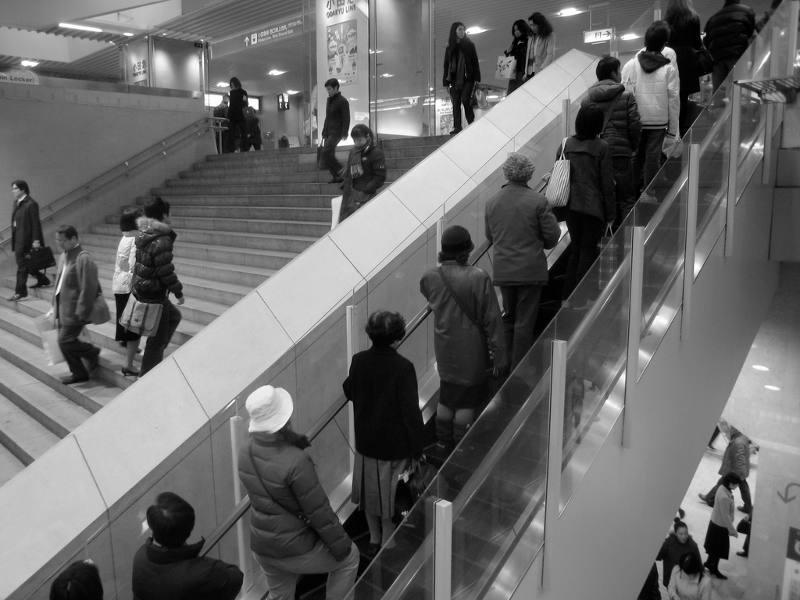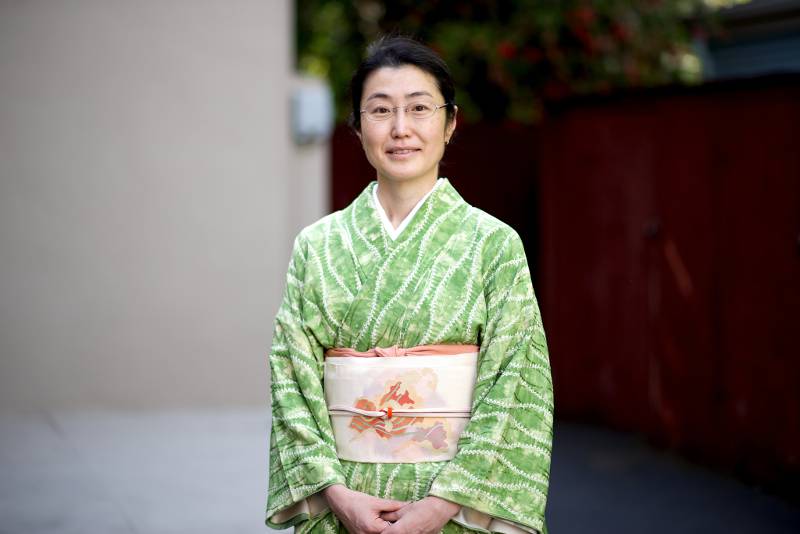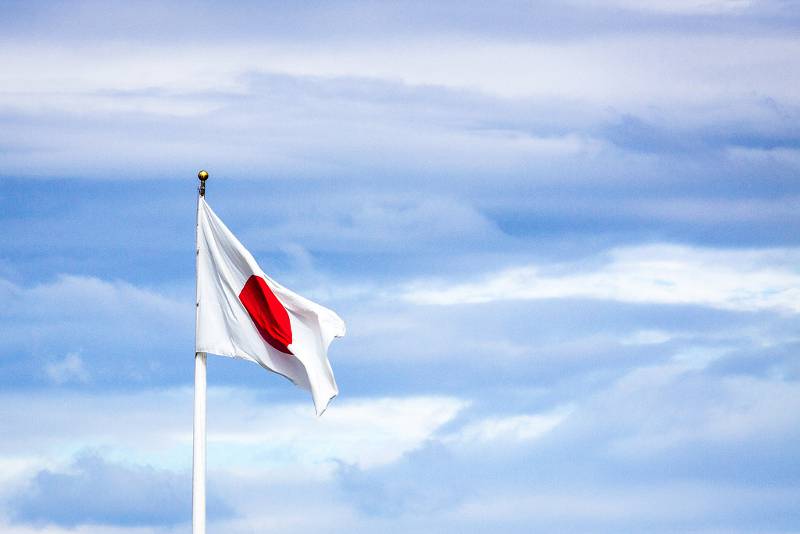So after exploring how conservative and hardworking the Japanese are, let's look at another related topic. The (very condensed) logic goes like this:
Fact 1: Japan's streets are really clean. And the Japanese don't really seem to litter. Fact 2: Japan is (generally) safe and there's usually no problem with walking around at 2 am. Fact 3: Japan is orderly. You probably heard of the neat lines at disaster camps immediately after the 3/11 earthquake of 2011. Looting would most likely have occurred elsewhere.
Conclusion: Japanese people are responsible.
This isn't as common a stereotype as the previous ones I've talked about, but I still do hear about this from time to time. Variations of this include statements that the Japanese are civic-minded or mature.
To me, responsibility has two parts. There's the follow-the-rules part which the Japanese excel at and which is clearly reflected in the general peace that tourists observe in Japan. However there's a more proactive element to responsibility too – the part which requires that people not just follow the rules but make new ones when those existing don't work anymore.
This is where the Japanese come a bit short.
Good at Following Rules

If you've been to Japan you don't need me to say much about this. You probably noticed the very clean streets despite the fact that there are hardly any trash bins around. Indeed the Japanese do hold on to their trash until they reach home or the nearest combini. You also may have noticed a very low (not zero) crime rate and it's not as if there's that particularly strong a police presence on the Japanese streets anyway. Heck, they peacefully ride their bicycles around and will even help you – very nicely – if you're lost and ask them for directions. It all leaves the general impression that everyone is law-abiding.
The statistics back this up. This website, calculating a "crime index" score based on various statistics, puts Japan as the country with the 8th lowest score in the world. This is furthered by this table which notes Japan's very low homicide rate – outranked only by countries such as Liechtenstein, Singapore (yay!) and a few others.
Of course crime statistics only reflect crimes that are actually reported. But I can't think of a reason why Japanese people are less likely to report homicide and robbery than people in other countries. Distortions arise when it comes to crimes which have a certain "shame" element – we're talking about molestation, domestic violence, and rape – but this alone doesn't fully account for the gap in statistics. The Japanese are indeed less likely to cause violent crime than people from other countries.
Some rather interesting incidents follow from this. People who have lost their phones and wallets in Japan will likely tell you about how a very kind Japanese person returned it to the nearest police box. And I have to say I don't know any other country where this would happen so commonly. Another example – a friend of mine, as what occurs in many other places in the world, torrented a textbook for class. He then posted a status on Facebook offering his coursemates a copy – just message me.
Bad move. What came after was a hail of universal castigation and horror and sonna koto shicha dame yo. Perhaps unthinkable anywhere else and very "only-in-Japan," but this certainly fulfills the definition of "responsibility".
A Cultural Grounding?

So what makes things this way? I don't have a concrete answer but there's a few explanations that people point to.
Firstly some cultural explanations: this article raises a few (and some limitations to Japan's crime-free image). Maybe there's something in Confucian cultures and "shame societies" that explains why Japan fits within the wider pattern of low crime in East Asia.
In addition to that there's another layer of the Japanese concept of "meiwaku" (to trouble someone else). The Japanese themselves go through pains to avoid "meiwaku o kakeru" (troubling other people) so perhaps this layers on top of the Confucian culture stated above. Many people also refer to the state of the Japanese classroom – that it is the kids and not the janitors who are in charge of cleaning the classrooms. Also it is the students who distribute school lunches. The conclusion therefore is that these tasks have instilled a sense of duty in them. Some others refer to Japan's low gun ownership for low violent crime levels.
Other explanations refer to economics – pointing out that Japan has a much lower rate of inequality compared to, for example, the USA. But this argument doesn't make much sense given the other East Asian countries with similarly low crime rates but with much higher levels of inequality (eg. Hong Kong). Maybe there's something to be said about the Japanese culturally-speaking being more rule-abiding.
The Other Side of the Coin

You may have noticed that so far I'm deliberately avoiding the words "responsible", "ethical" and "civic". The first reason is that while everyday crime may be low, this doesn't stop Japan from having big scandals very contrary to public interest. A short list to refresh your memory:
-
The Fukushima disaster and clear lapses in public accountability from all sides.
-
Environmental disasters in the period of rapid growth (see Four Big Pollution Diseases of Japan) – clearly there was nothing intrinsically cultural back then to stop companies from acting in this manner.
-
This year marks the 20th anniversary of the Tokyo Sarin Gas attacks – the perpetrators were Japanese. The cult was founded in Japan and many of the members were actually members of the Japanese elite. The victims were of course Japanese.
So there are quite a few examples of Japanese irresponsible behavior, but in what ways is this irresponsibility expressed?
Responsible – but to Whom?

The above examples show that in Japan, loyalty and following the group's orders sometimes overrules responsibility to society. But then again this is no different from any other part of the world – sub-prime loans and the banking crisis a few years back being an example.
The more peculiar point in Japan's case is that people may need to be more responsible to themselves instead of the social groups and institutions they belong to. Karoshi (death from overwork, see this article for more info) is the most obvious example. Besides this example, perhaps it would be better if the Japanese sometimes don't do the "endure-and-sumimasen" which you see quite often. Certainly this is linked to the Japanese idea of humility – When you see an angry old Japanese man berating some shop staff for something which really isn't her fault, you might think that maybe she shouldn't apologize so much.
What About Rotten Rules?

One part of responsibility involves not breaking rules. The other part is actively contributing to society, which can sometimes mean not blindly following outdated/unfair/unnecessary rules.
The second point requires a proactive attitude which isn't that strong in Japan. Consider the following:
Japanese people spend around the same time volunteering as those in other OECD countries. This book notes that Japan has a very small professional civil society sector. That is, Japanese people take an active role in, for example, neighborhood associations and Parent Teacher Associations (which partly function as social gatherings). However, when it comes to NGOs which actually require full time employed staff – that is to say, those which are more likely to be tackling actual social problems and involved in advocacy – the number of employees is extremely low compared to other developed countries. This in turn suggests weak cash flows, limited scope of activities, and a weak and small civil society within Japan.
This article also ranks Japan as number 120 in 153 countries on a "world giving index score". According to the study,
-
17% of Japanese have given money to charity in the last month (tied with 8 other countries at 107th place)
-
23% of Japanese have volunteered at an organization last month (tied with 4 other countries at 49th place, but note problems stated above)
-
25% of Japanese have "helped a stranger in the last month" (145th place)
The last one is problematic, since it's self-reported, and the Japanese may not feel like they're helping others when they are, and vice-versa for those in other countries. The question is whether this is enough to explain Japan's low ranking in these statistics.
Political participation is another topic which is more ambiguous. Japan doesn't actually have that low of voter ratings (around 52.6% in the most recent year vs. 54.9% 2012 US presidential elections). What is unambiguously discernible though is that the young are extremely disengaged. Japanese youth tend to think, in comparison to other surveyed countries, that their actions do not make much of a difference, which is reflected in low voting and political participation rates.
"Citizenship"

Note that Japan has faced quite a few changes regarding how "responsible" their citizens have been. Japan, like most of the developed West, was also caught up in a wave of militant student activism in the 1960s which died down very quickly in the 1970s. On the other hand, it was the 1995 Hanshin-awaji earthquake which is considered to have brought out a "volunteer revolution in Japan". On that note however, the earthquake 4 years ago has not galvanized civil society as much as one might hope, as explained in this article. This (very dense) article explains the history of it – that having an active citizenry (civil society) only became a trending idea after the Hanshin-Awaji disaster, but citizen activism was seen suspiciously in the context of left-wing agitation due to 1960s student movements.
What's important to recognize is that there are different aspects of what makes a responsible citizen. Yes, a responsible citizen respects the rules of society, sorts out their trash and returns lost cellphones and wallets. The first two are performed very well by the Japanese while the third makes them (in my view) exceptional. And I don't mean to say that this isn't important but as I've argued in the second half of this article, when it comes to an "active citizenry," Japan looks relatively weak. This is ironic because it's not like Japan has a lack of social problems which need attention.
In the end, it looks like an imbalanced picture for the Japanese – responsible in following the rules and decorum, but not so much when it comes to pushing for change and trying to solve problems in society.
